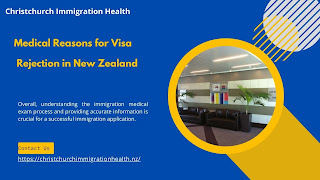Medical Reasons for Visa Rejection in New Zealand
Introduction
When it comes to applying for a visa to New Zealand, understanding the potential medical reasons for visa rejection is crucial. The New Zealand immigration system carefully assesses the health conditions of visa applicants to ensure the safety and well-being of both the individual and the community. In this comprehensive guide, we will delve into the various medical factors that can lead to visa rejections, empowering you with valuable insights and knowledge to avoid common pitfalls.
Importance of Meeting Health Requirements
New Zealand has strict health requirements in place to maintain the overall health standards within the country. These requirements serve as a preventive measure against the introduction or spread of communicable diseases. By adhering to these health regulations, New Zealand aims to protect the health and safety of its residents, visitors, and immigrants.
Understanding Medical Examinations
As part of the visa application process, individuals are often required to undergo a medical examination. This examination is conducted by authorized panel physicians who are appointed by Immigration New Zealand. The purpose of the medical examination is to evaluate an applicant's health condition and determine if they meet the health requirements for visa approval.
Common Medical Reasons for Visa Rejection
1. Tuberculosis (TB)
Tuberculosis is a contagious disease caused by bacteria that primarily affects the lungs. Applicants with active TB or a history of TB that poses a significant health risk may face visa rejection. It is important to note that individuals with latent TB, which is non-infectious, can still be granted a visa under specific circumstances.
2. Human Immunodeficiency Virus (HIV)
New Zealand considers HIV infection as a potential ground for visa rejection. The immigration authorities assess the risk of an applicant requiring significant medical care or posing a public health risk due to HIV. However, it is important to note that each case is evaluated individually, taking into account the specific circumstances and available medical treatments.
3. Mental Health Conditions
Certain mental health conditions can lead to visa rejection if they are deemed to pose a significant risk to the individual or the community. Immigration New Zealand carefully considers factors such as the severity, treatment requirements, and potential impact of the condition on the applicant's ability to integrate into society.
4. Significant Medical Costs and Demands
If an applicant's health condition is likely to impose substantial costs on New Zealand's public health system or require extensive healthcare services, the visa may be rejected. Immigration authorities assess the potential burden that an individual's medical condition may place on the country's healthcare resources.
Steps to Avoid Visa Rejection
While the medical reasons mentioned above can potentially lead to visa rejection, it is essential to remember that each case is evaluated on an individual basis. However, there are steps you can take to enhance your chances of a successful visa application:
1. Medical Assessment Prior to Application
Consider undergoing a thorough medical assessment before submitting your visa application. This can help identify any potential health issues that may affect your application. Consulting with a qualified healthcare professional or panel physician can provide valuable insights and guidance.
2. Compliance with Treatment Plans
If you have a known medical condition, it is important to demonstrate that you are actively managing it and following prescribed treatment plans. Providing comprehensive medical records, test results, and supporting documentation can help strengthen your application.
3. Seeking Professional Guidance
Navigating the visa application process can be complex, especially when it comes to medical requirements. Engaging the services of an experienced immigration consultant can provide you with expert guidance, ensuring that your application meets all the necessary criteria.
Conclusion
Understanding the medical reasons for visa rejection in New Zealand is vital for a successful visa application. By being aware of potential health-related issues and taking proactive steps to address them, you can enhance your chances of securing a visa. Remember, each case is evaluated individually, and providing comprehensive medical documentation and seeking professional guidance can significantly contribute to a positive outcome.
Useful Articles Link
full Medical for Nz Immigration
Book appointment for Nz Immigration
A Comprehensive Guide to Medical Tests for Visa Applications
What Are The Visa Requirement Documents For The New Zealand Visa For Indians?
The Top 5 Things You Need to Know Before Immigrating to New Zealand
Best Immigration Medical Needs in New Zealand
What are the advantages and disadvantages of immigrating to New Zealand?





Comments
Post a Comment